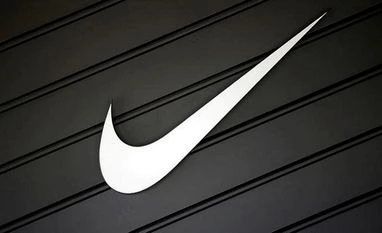After hitting a record high on Thursday, Nike Inc. is finding it harder to keep investors happy.
Even though the company posted quarterly results that sailed past Wall Street estimates, the shares dipped in Friday trading, suggesting some investors were looking for an even bigger upside surprise.
Fiscal second-quarter profit rose to 70 cents a share, Nike said, beating 58-cent average of analysts’ estimates. The company overcame headwinds from tariffs that were stiffest in the period, boosting sales by 10% to $10.3 billion and topping projections.
“Our brand is connecting deeply with consumers everywhere,” Chief Executive Officer Mark Parker, who will step down next month, said on a conference call. “Our innovation is helping athletes prove that there are no limits. We’re challenging the conventions of retail at every term.”
Nike executives said they expect revenue for the third quarter, ending in February, to grow by a high single-digit percentage, and reiterated the same expectation for the full year. The company expects third-quarter gross margin to remain flat year-over-year, at around 45.1%.
Parting ways
While Nike routinely beats profit estimates, its shares don’t always follow suit. The company has exceeded estimates in every quarter but one going back to mid-2012, but the stock has declined about a third of the time.
Shares of Nike fell as much as 2.3% in New York trading Friday. The stock touched an all-time high Thursday, closing at $101.15.
Two possible negatives: Profit margins and inventories. Nike’s gross margin expanded to 44%, short of estimates of 44.1%. The margins have grown as the company focuses more on selling direct to its customers.
Chief Financial Officer Andy Campion said on the call the margin numbers were the result of a lot of factors, many not directly tied to product. Tariffs cut the figure by 40 to 50 basis points, while investments in the company supply chain and apparel distribution also added to the pressure, along with currency fluctuations.
Rising inventory
Inventory rose 15% to $6.2 billion, an all-time high. Nike said that jump was a result of strong global demand, as well as a higher rate of on-time deliveries from factories. The Bloomberg MODL estimate for inventory growth was 6.1%.
It was a busy quarter for Beaverton, Oregon-based Nike. The company named a new CEO, recently sold the surfing brand Hurley, and also drew criticism from Vice President Mike Pence over its business in China.
Unlock 30+ premium stories daily hand-picked by our editors, across devices on browser and app.
Pick your 5 favourite companies, get a daily email with all news updates on them.
Full access to our intuitive epaper - clip, save, share articles from any device; newspaper archives from 2006.
Preferential invites to Business Standard events.
Curated newsletters on markets, personal finance, policy & politics, start-ups, technology, and more.
)